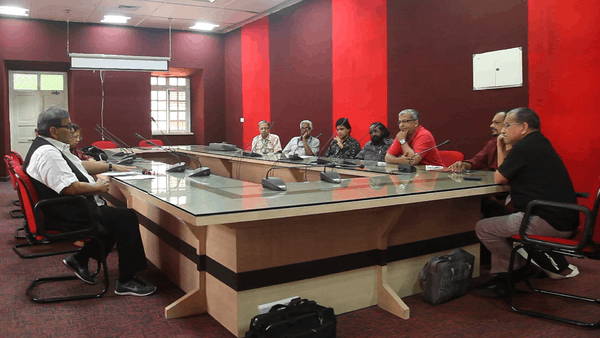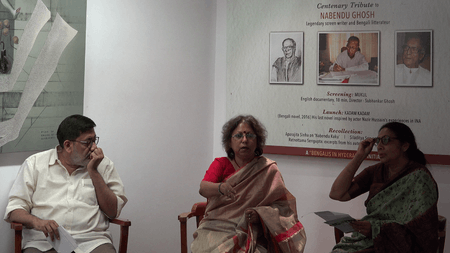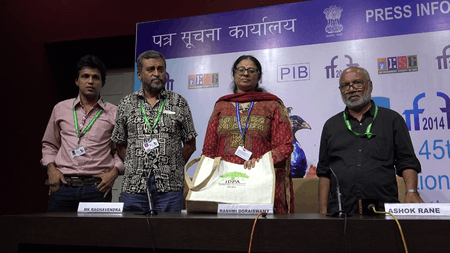Film Critics Circle of India

Film Critics Circle of India (FCCI) is a society comprising notable film critics from all the major film producing states of India.[2][3][4]
At the AGM, conducted at the International Film Festival of India—2013, Subhash Ghai said, "You are in a highly responsible profession. You have the responsibility to look into the growth of civilization and of the next generation. We filmmakers look upon you as God. So guide us in your reviews, tell us where we lack, and how we can improve. But do not mock us. Creative people are extra sensitive, so talk like a mother, not like an opponent."[5]
Awards
- FCCI Award for the Best Indian Film of 2015: Court (directed by Chaitanya Tamhane)
- FCCI Award for Best Indian Film at ALIIFF-2016: The Violin Player (directed by Bauddhayan Mukherji). “For the sensitive portrayal of conflict between the artistic vision of ideal life and harsh realities of the contemporary city life, depicted in an innovative and minimalistic style.” [6]
- FCCI Award for Best Debut Director at HBFF-2016: Debesh Chattopadhyay (Natoker Moto). “For the sensitive cinematic portrayal of the struggle of a dedicated artistic soul in a powerful visual odyssey that reinforces cinema, theater and lived life.” [7]
- FCCI Special Mention Award at HBFF-2016: Cinemawala (directed by Kaushik Ganguly). “For directing the spotlight on the grave crisis engulfing the celluloid art with the inevitable march of technology.”
FCCI panels at film festivals

ALIIFF-2016: Impact of social media on critics [8]
Baradwaj Rangan: "Social media has taken away the aspect of word-of-mouth and has kind of separated it from film criticism, which is, I think, the best thing that has ever happened, because, far too often, people mistake film criticism from something that should tell them whether or not they should go watch a film."
Mayank Shekhar: "As Baradwaj pointed out, film criticism has various approaches - historical, social... The journalistic approach has traditionally been about newly-released films. The reader basically just wants to know if the reviewer at the end of the day liked the film or not."

IFFI-2014: Does technology kill good cinema and sensitivity? [9]
M.K. Raghavendra: "Kubrick’s futuristic masterpiece '2001: A Space Odyssey' was made in 1968. In the last forty-six years nobody has made a film with a similarly profound influence on how we think, despite the revolutionary changes in technology. Emotions do not need fresh technology, and some stories are never remade".
Rashmi Doraiswamy: "Films today are shot and edited non-linearly; even a piece of music is recorded non-continuously, with stops between each line of singing. Original is no more relevant in this synthetic culture of packaged entertainment. Reality and technology both are fragmented to today’s connected generation, influencing each other".
Ashok Rane: "In an industry where the producers want to use magic technologies without even thinking about story, plot or characters, technology is doing more harm than benefit. There is a growing tendency where even low budget films try to use chroma and multi-point tracking, most of the time in pathetic ways".
Books on cinema by FCCI members (incomplete)
- 100 Years of Indian Cinema /Premendra Mazumder
- 25 Loka Cinemakal /G.P. Ramachandran
- A Life in Veil: Suchitra Sen /Ratnottama Sengupta
- Alivinte Mandarangal /Madhu Eravankara
- Asian Film Journeys: Selections from Cinemaya /Rashmi Doraiswamy, et al
- Asoumiya Chalachitrar Chaa-Pohar /Apurba Sarma
- Barley Vayalukale Ulaykkunna Kattu /Madhu Eravankara
- Being and Becoming: the Cinemas of Asia /Rashmi Doraiswamy, et al
- Cinema Talkies /C.S. Venkiteswaran
- Cinemayum Malayaliyude Jeevithavum /G.P. Ramachandran
- Cinemayum Prathaiyayasasthravum /V.K. Joseph
- Cinemchi Goshta /Anil Zankar
- Conversations with Mani Ratnam /Baradwaj Rangan
- Desham Pauratwam Cinema /V.K. Joseph
- Dispatches from the Wall /Baradwaj Rangan
- Echoes and Eloquences: the Life and Cinema of Gulzar /Saibal Chatterjee
- Encyclopaedia of Hindi Cinema /Anil Zankar, Ratnottama Sengupta, Saibal Chatterjee, et al
- Encyclopedia of Postcolonial Literatures, Ed 2, Vol 1 /Rashmi Doraiswamy, et al
- Film Society Movement: a Success of Failure /Premendra Mazumder
- Guru Dutt: Through Light and Shade /Rashmi Doraiswamy
- Hindi Commercial Cinema: Changing Narrative Strategies in Frames of Mind: Reflections on Indian Cinema /Rashmi Doraiswamy, et al
- Idiocy and Civilisation: A Study of Dostoevsky’s The Idiot in The Russian Enigma /Rashmi Doraiswamy, et al
- Hollywood Bollywood: the Politics of Crossover Films /Saibal Chatterjee, Utpal Borpujari, et al
- Image and Imagination: Reconstructing the Nation, in ‘India: A National Culture /Rashmi Doraiswamy
- India: a National Culture /Rashmi Doraiswamy, et al
- Indian Cinemayil Ninnu Indiaye Kandethumpol /G.P. Ramachandran
- Indian Film Culture: Indian Cinema /Amit Khanna, Dalton L, Ganesh Matkari, Manoj Barpujari, Premendra Mazumder, Rashmi Doraiswamy, Siladitya Sen, Sukanya Verma, et al
- Jaane Bhi Do Yaaro: Seriously Funny Since 1983 /Jai Arjun Singh
- Kaalathinte Adarukal /Madhu Eravankara
- King Khan /Deepa Gahlot
- Loka Cinema Kazhchayum Sthalakaalangalum /G.P. Ramachandran
- Loka Cinema Yathrakal /G.P. Ramachandran
- Loka Cinemayude Moonnam Kannu /Madhu Eravankara
- Malayala Cinema Padanangal /C.S. Venkiteswaran
- Malayala Cinema: Desam, Bhasha, Samskaram /G.P. Ramachandran
- Cinemayile Avismaraneeyar /Madhu Eravankara
- Cinemayum Sahithyavum /Madhu Eravankara
- Mughal-e-Azam: Legend as Epic /Anil Zankar
- Popcorn Essayists, The /Jai Arjun Singh
- Post-Soviet Condition: Chingiz Aitmatov in the ’90s, The /Rashmi Doraiswamy
- Reflections on Indian Cinema /Rashmi Doraiswamy, et al
- Handbook of Indian Cinemas /Anil Zankar, et al
- Yathrakal: KR Mohanante Cinema /C.S. Venkiteswaran
- Kapoor (The Legends of Indian Cinema) /Deepa Gahlot
- 25 Daring Women of Bollywood /Deepa Gahlot
- 2: 50 Films that Deserve a New Audience /Deepa Gahlot
- Tharasancharangal /C.S. Venkiteswaran
- Machu-Machu, Shaktam Makhal-Makhal /R.K. Bidur Singh
- World of Hrishikesh Mukherjee, The /Jai Arjun Singh
Other important film bodies in India
- Federation of Film Societies of India
- Film Federation of India
- Indian body of FIPRESCI
- Indian Film Critics Association
See also
- International Film Festival of India
- Hyderabad Bengali Film Festival
- All Lights India International Film Festival
References
- ↑ "Critics' opinions impact filmmakers: Subhash Ghai". The Hindu. 2013-11-26. ISSN 0971-751X. Retrieved 2016-10-30.
- ↑ https://www.goaprism.com/iffi-2014-panel-discussion-session-1-newspapers-replaced-literature-cinema/
- ↑ http://www.deccanchronicle.com/entertainment/bollywood/030716/hyderabad-bengali-film-festival-kicks-off-in-style.html
- ↑ http://www.newindianexpress.com/cities/kochi/2013/jun/14/Film-appreciation-camp-486641.html
- ↑ http://www.thehindu.com/news/national/opinions-of-critics-impact-filmmakers-subhash-ghai/article5387987.ece
- ↑ http://aliiff.com/winners2016
- ↑ http://hbff.in/awardsinhbff/
- ↑ http://www.thehindu.com/features/magazine/baradwaj-rangan-on-social-media-changing-the-dna-of-film-criticism/article9196927.ece
- ↑ http://www.thehindu.com/todays-paper/tp-features/tp-metroplus/frame-work/article6666360.ece